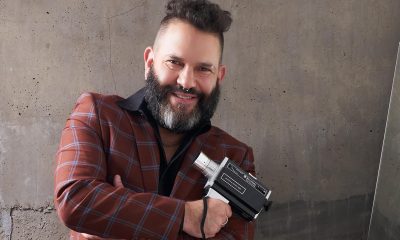Movies
The year’s best in queer TV and film
‘Fire Island,’ ‘Bros,’ ‘Heartstopper’ made for memorable 2022
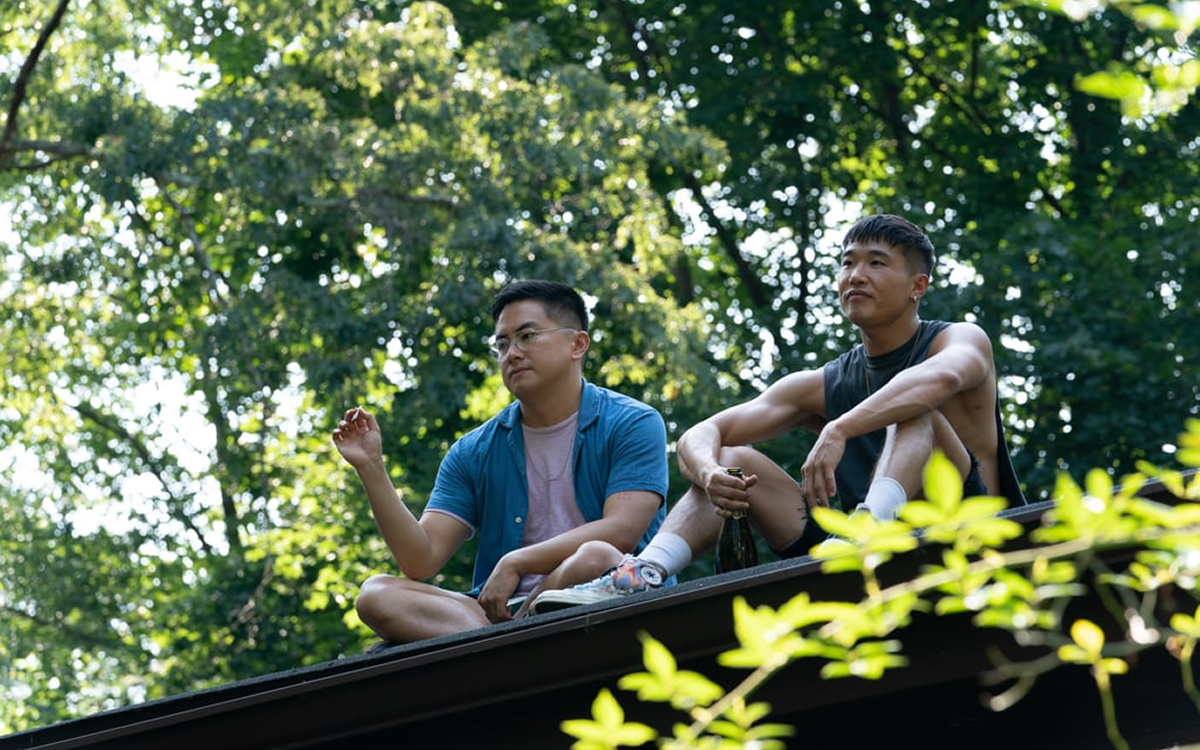
It’s that season, once again, when everyone is compiling their lists of the year’s best film and TV offerings – and naturally, the Blade is no exception.
Unlike many “Best of” lists, however, ours narrows the scope a little. Since our coverage of film and television is geared toward queer-focused or queer-inclusive content that is relevant to our LGBTQ readers, we like to limit our selections to the movies and shows that match that criteria – and further, to keep it honest, we prefer to limit our choices to the titles we’ve covered over the last 12 months.
That means you won’t see the same kinds of big mainstream films or series on our list that you’ll find on others – but you’ll see those mentioned in plenty of other places, anyway, and we think it’s far more useful to remind our readers of the standout gems we’ve particularly loved. It’s our way of celebrating the screen memories that have stuck with us throughout the year, and to make sure you add the ones you may have missed to your year-end catch-up list.
With that in mind, here are our five favorite films and five favorite TV shows from all those we’ve covered in 2022.
FILM
1. “Everything Everywhere All at Once”
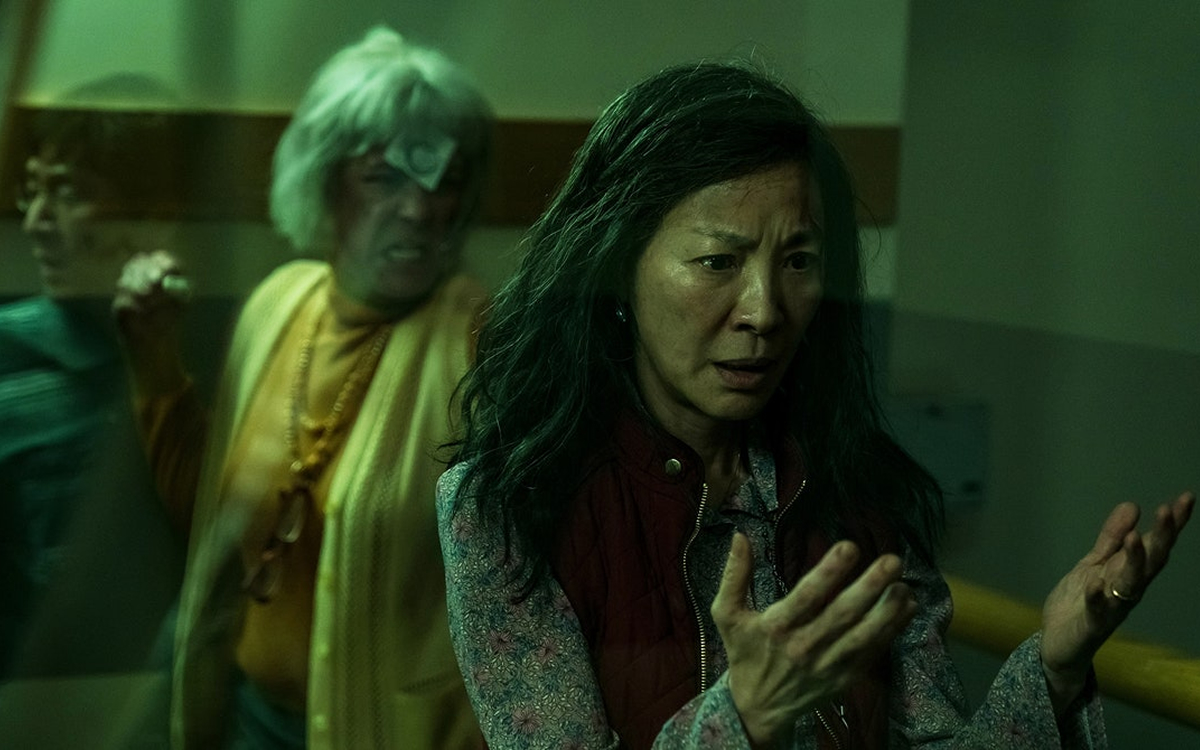
If you haven’t yet seen this genre-bending, queer-inclusive indie sci-fi comedy – conceived, written, and directed by The Daniels (Dan Kwan and Daniel Scheinert) – you might be surprised to find it at the top of our list. If you have seen it, however, you’ll already understand why. Audaciously joining the ever-growing fray of “multiverse” movies and arguably besting them all, it’s a fast-paced but smooth-flowing wild ride in which a middle-aged Chinese American laundromat owner (Michelle Yeoh, in a career-topping star showcase) finds herself recruited into a battle against a sinister entity who seeks to destroy reality itself.
Quirky, clever, and laced with delicious absurdity, it’s a madcap caper from start to finish; but it grabs us by the heart, too, and uses the same overblown fantasy trope it creatively lampoons to gently remind us that, in a universe of infinite possibilities, we have the power to change our reality with every choice we make. It also shows us a universe where humans have fingers like hot dogs and gives us scene-stealing Jamie Lee Curtis as a frumpy and hostile tax auditor, so is it any wonder we put it at the top of the list?
2. “Tár”
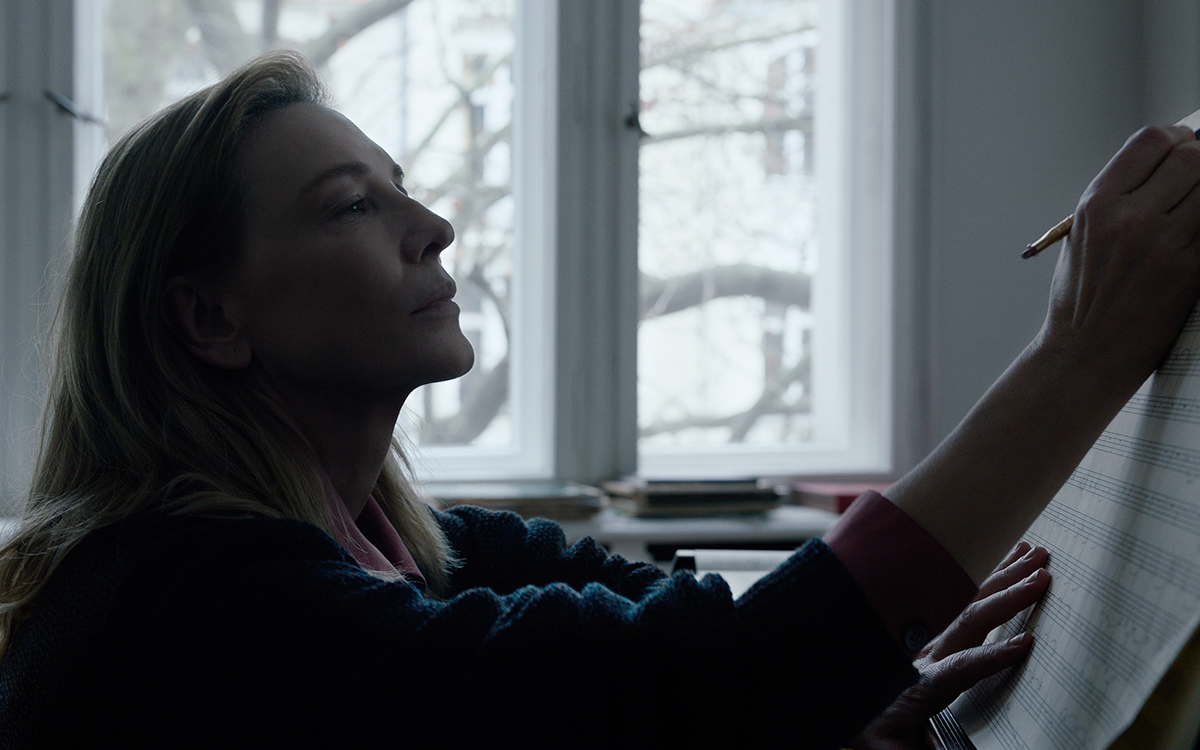
Audiences were even more divided than critics in their response to Mike Field’s lengthy, inscrutable, and culturally provocative character study of a revered, world-class orchestral conductor (Cate Blanchett, surpassing her own brilliance yet again) whose reputation and career begin to unravel when implications of sexual misconduct subject her private life to public scrutiny. It’s easy to understand why; it’s as challenging as it is meticulous, as unsettling as it is mesmerizing, and as unsentimental as a clinical case study.
Though decried by some who saw it as an indictment against “cancel culture” or found it out of alignment with queer or feminist ideals, we found its true power beyond its purposefully contradictory politics; in its instinct for finding big truth in tiny details and its merciless focus on the uncomfortable secret corners we keep in the blind spots of our lives, it’s ultimately a movie about the masks we wear to disguise the desires we don’t want others – or even ourselves – to see.
3. “Neptune Frost”
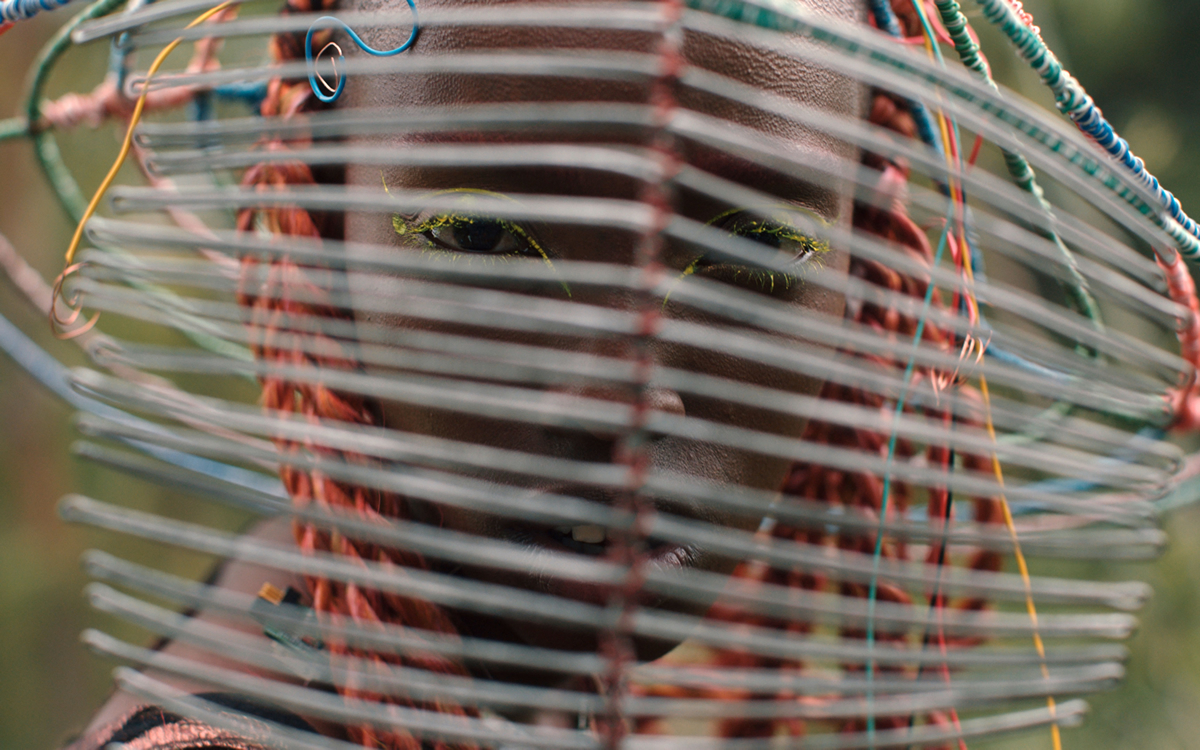
Another quirky, genre-bending sci-fi movie makes our list with this unique cinematic experience created by acclaimed multi-hyphenate artist Saul Williams, who co-directed with Rwandan filmmaker Anisia Uzeyman. Self-described as “an Afrofuturist sci-fi punk musical,” it traces the separate journeys of two refugees – a miner running away from a life of enforced labor and an intersex tribesperson fleeing the oppression of their native village – and their assimilation into a collective of rebel hackers dedicated to overthrowing “The Authority” and elevating the world’s consciousness. That vague plot outline, however, falls short of capturing the film’s multi-layered essence; equal parts primal myth and dystopian techno-drama, it’s more a surreal allegory than a narrative, laden with bold visual strokes and reverberating with a proud and defiant Black voice – but the issues it thrusts into our consciousness go far deeper than race. It’s hard to explain this movie better than that, so if you’re curious for more, you’ll have to watch it for yourself. Trust us, you won’t regret it.
4. “Fire Island”
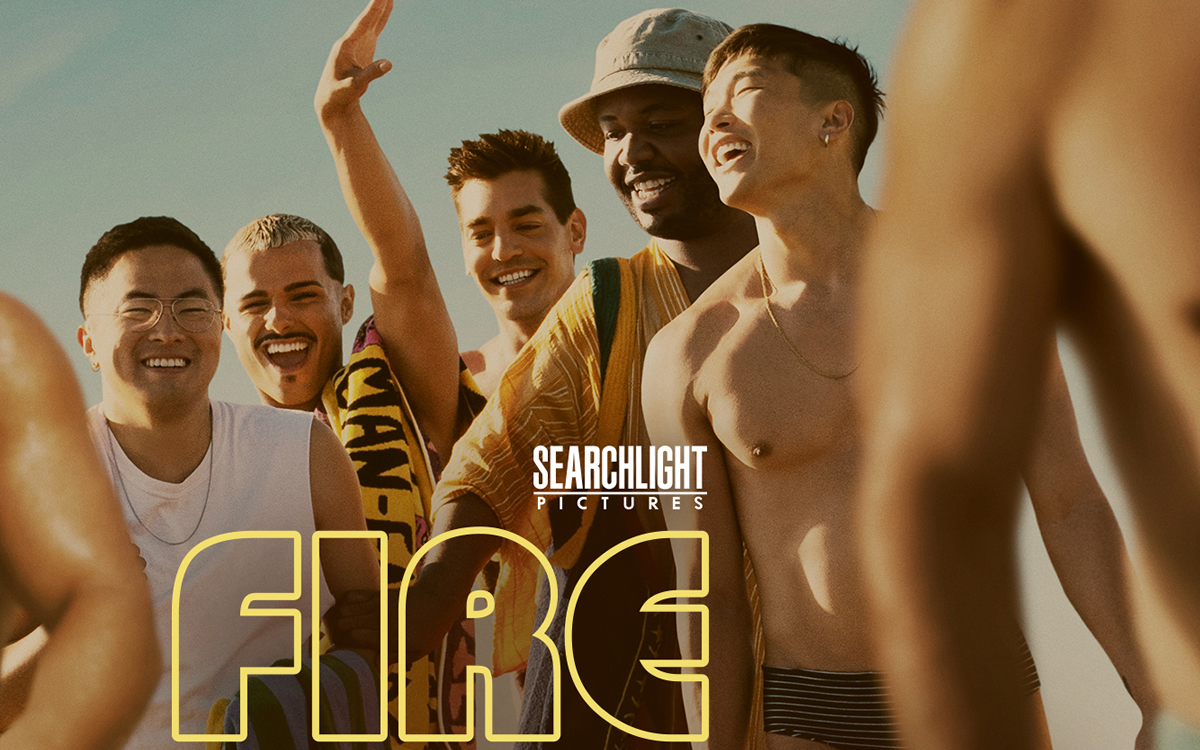
It’s been a banner year for queer rom-coms, but for our money, this smart, sharp, sweet, and sexy reimagining of Jane Austen’s “Pride and Prejudice” – starring and written by Joel Kim Booster and directed by Andrew Ahn – is the cream of the crop. Skewering the attitudes and agendas of modern gay life as it follows the exploits of a group of friends who have gathered for a week of comradeship and debauchery at the queer mecca of its title, it revels in its diversity – three of its four romantic leads are Asian American, for starters – and celebrates the joys of chosen family while good-naturedly reminding us that snobbery cuts both ways. It’s everything you could want from a summer romance and more – including a ridiculously corny, over-the-top happy ending and a sparkling cast that includes queer fan favorites Bowen Yang, Margaret Cho, and Conrad Ricamora.
5. “Bros”
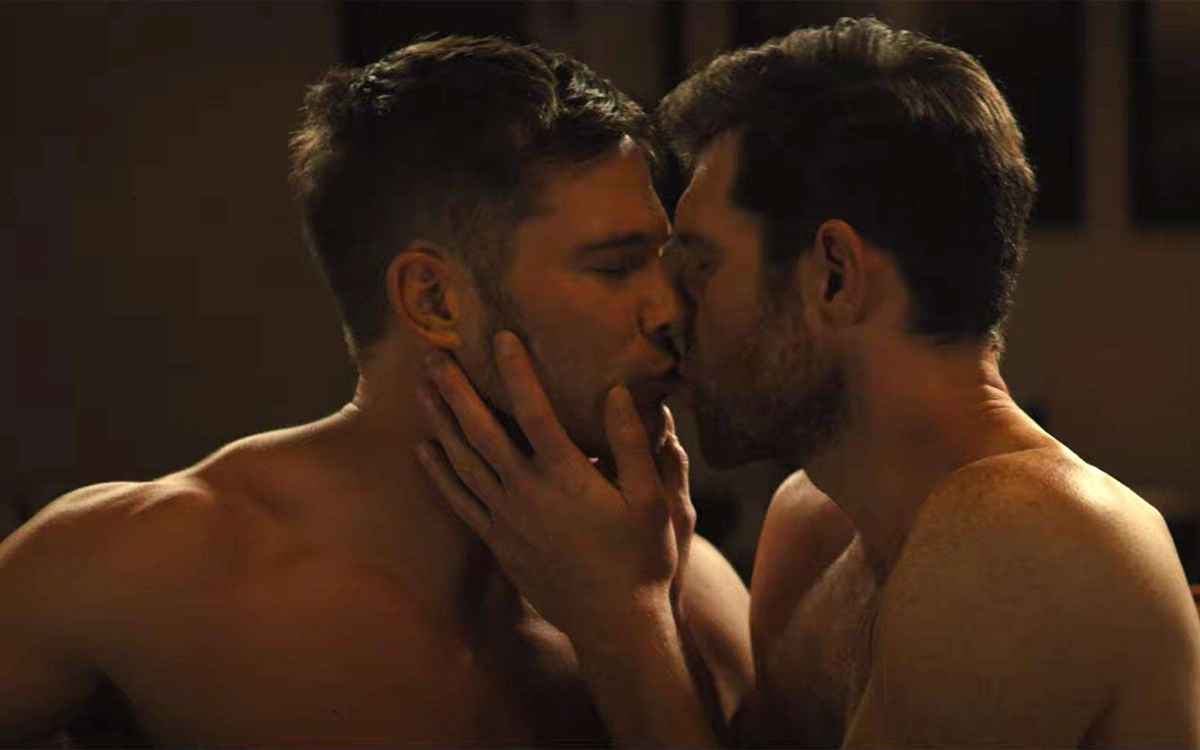
OK, we know. This much-hyped romantic comedy from writer/star Billy Eichner and writer/director Nicholas Stoller ended up with a disappointing box office take despite its historic use of an almost-all-queer cast and creative team – but that doesn’t mean it’s not a great movie. Though Eichner’s manic, sometimes abrasive persona can be a hard sell for some audiences, it works to his advantage as he uses his role as a defiantly oddball over-achiever to go deeper, and his chemistry with co-star Luke Macfarlane (in a bravely vulnerable performance) is surprisingly potent; and while the film’s self-consciously pro-LGBTQ checklist of topics sometimes feels like an obtrusion on its unexpectedly nuanced central love story, that somehow becomes part of the point.
For us, though, the biggest reason for including this one on our list of the year’s best might be its candid and relatable depiction of romance in a more mature queer demographic than we’re used to; that, alongside its unapologetically queer attitude, its artfully downplayed generosity of spirit, and its sex-positive treatment of non-hetero-conforming intimacy, is more than enough to render its box office receipts irrelevant.
TELEVISON
1. “Heartstopper”
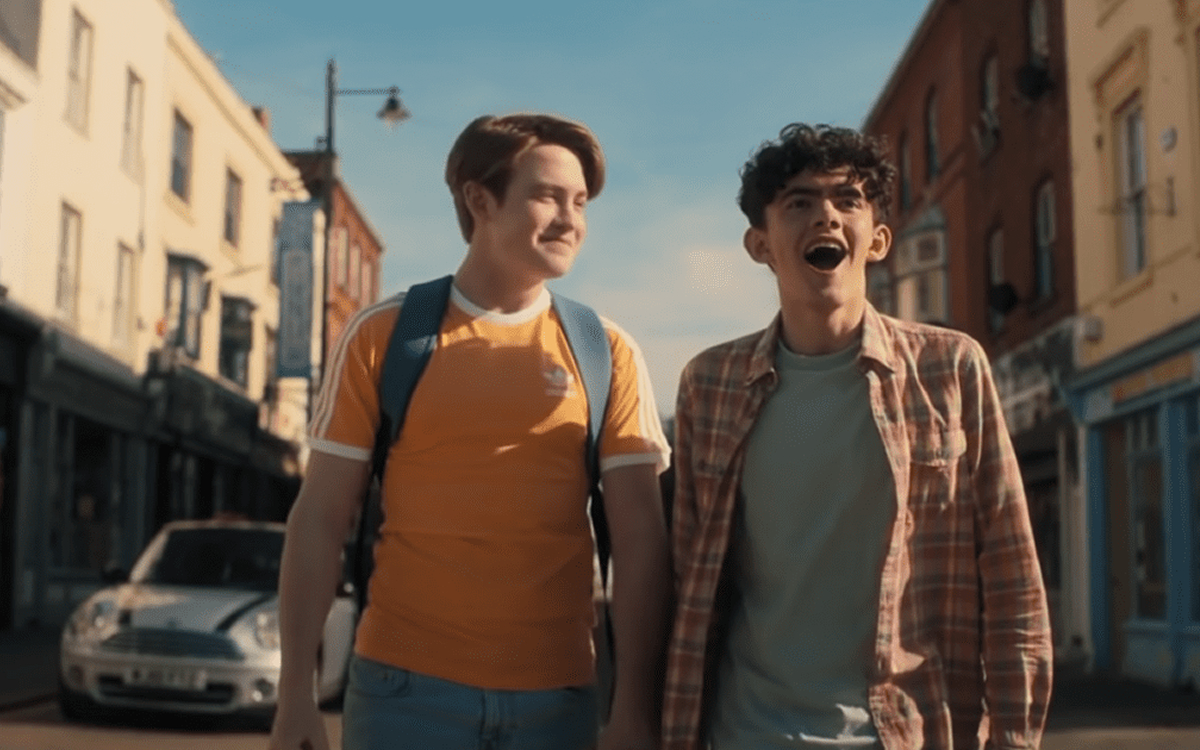
This one is a no-brainer. The British Netflix import based on the webcomic by Alice Oseman (who adapted it for the screen) is a show to win the heart of even the most cynical viewer and have them ready to binge it straight to the end after watching only the first five minutes. The story of two boys’ school students – on opposite ends of the campus popularity spectrum – who form an unlikely friendship that blossoms into something more, is infectiously sweet and unrelentingly positive without feeling like an impossible fairy tale. More than that, its tender depiction of two youthful hearts negotiating the pangs and pressures of first love while navigating their school’s deeply ingrained social hierarchy has enough universal and multi-intersectional appeal to help it transcend its “queer content” genre and become an all-inclusive touchstone for younger generations – and to make older viewers wish they had grown up with a show like this one. None of it would work, however, without the soulful and endearing performances of series leads Joe Locke and Kit Connor, whose individual talents and shared chemistry make this big-hearted show a classic for the ages.
2. “Interview With the Vampire”
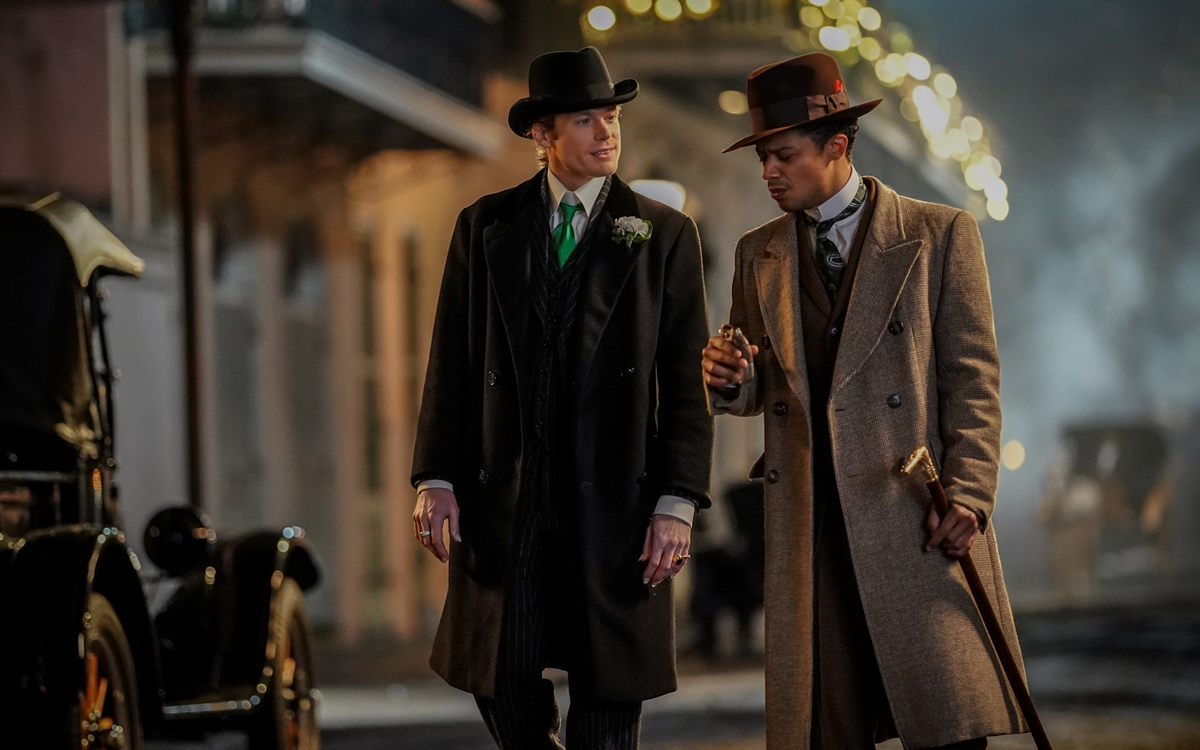
Three decades after Anne Rice’s saga of love among the undead was turned into a plush big screen star vehicle for Brad Pitt and Tom Cruise, fans of the late author’s wickedly sexy and thrillingly subversive novel – and the multi-book series that followed it – finally got the version they deserved with AMC’s electrifying adaptation.
Reimagining key details of Rice’s seminal narrative (changing her lead vampire’s origin story in old New Orleans to make him a Black creole entrepreneur instead of a wealthy white plantation owner with slaves, for one) to update its cultural relevance, it still maintains a strong connection to the passionate, poetic spirit of the original tale; even better, it more than makes up for the film version’s comparative “straight-washing” by embracing the same-sex romance between the story’s beloved protagonists – sensitive fledgling vampire Louis (Jacob Anderson) and his flamboyant creator-turned-lover Lestat (Sam Reid) – to cement the connection between Rice’s brooding, sexually fluid vampires and the millions of queer fans that have seen themselves reflected in the pages of Rice’s books all along. To top it all off, it pulls no punches in rendering both the gory savagery of the story’s horrors and the brazen eroticism of its sensually enhanced supernatural heroes – meaning that even if you’re never heard of Anne Rice, you’ll be hooked by the end of the first episode.
3. “The Andy Warhol Diaries”
Netflix makes the list again with this comprehensively drawn Ryan Murphy-produced docuseries that takes a deep dive into the text – and between the lines – of the infamous queer pop artist-and-tastemaker’s notoriously opaque posthumously published diary. Supplemented by insights from surviving members of Warhol’s inner circle and imagery from the extensive archives he left behind, it attempts to reveal the fragile inner life of an enigmatic figure who made lack of substance a cornerstone of his career; it succeeds beyond expectation, revealing a heartbreakingly human voice behind the minutiae he recorded from his daily routine, casting light on the romantic relationships he took pains to keep separate from his public image, and hinting at a greater connection between his emotional life and his art than critics and commentators have previously acknowledged.
While it might not drop any bombshells or change the cultural conversation around Warhol and the era he helped to define, it gives us a behind-the-curtain glimpse that expands our empathy toward one of our greatest queer icons – aided by the controversial-but-effective AI-enhanced voice of actor Bill Irwin reading excerpts from the diary as Warhol – and that’s perhaps a much more meaningful accomplishment.
4. “Reboot”
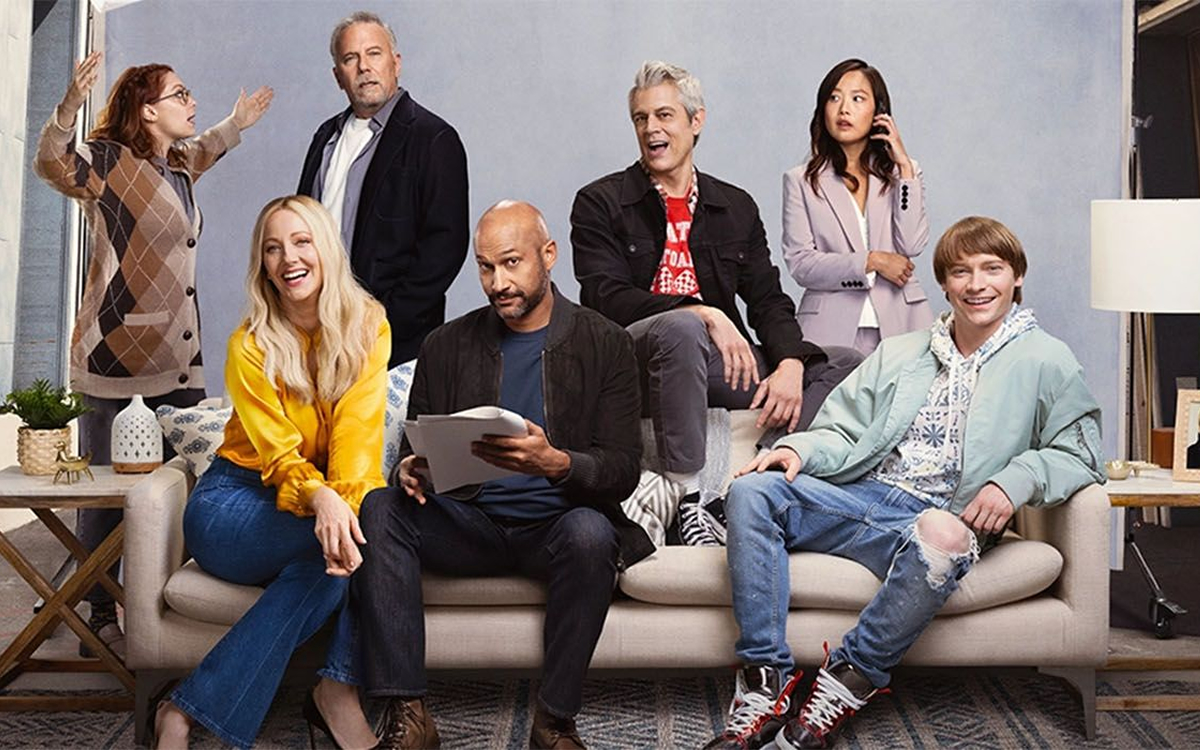
The most traditional series on our list, perhaps, is this queer-inclusive Hulu gem from “Modern Family” co-creator Steven Levitan, in which a young television writer (Rachel Bloom) gets a green light for her proposed reboot of a beloved ‘90s sitcom, which she plans to reinvent for a modern audience; her plan hits a snag, however, when the network brings in her father (Paul Reiser) – the original show’s creator – as a showrunner.
Complicating things even further is the show’s returning cast (Keegan-Michael Key, Judy Greer, Johnny Knoxville, and Calum Worthy), a dysfunctional collection of now-faded stars whose off-camera lives and relationships continually threaten to derail the production. The premise not only sets up a ripe field for comedy about the cultural conflicts and differing attitudes between older and younger generations, but it also provides limitless possibilities for Hollywood’s favorite pastime of making fun of itself; a top-flight, talented cast makes sure neither of those tropes feel tired, and Levitan’s signature rapid-fire comedic style ensures that every episode is laugh-out-loud funny. Our only complaint is that it’s so binge-worthy we burned through the debut season – which with only eight episodes feels frustratingly brief – and now we’re forced to wait for the next one.
5. “The Sandman”
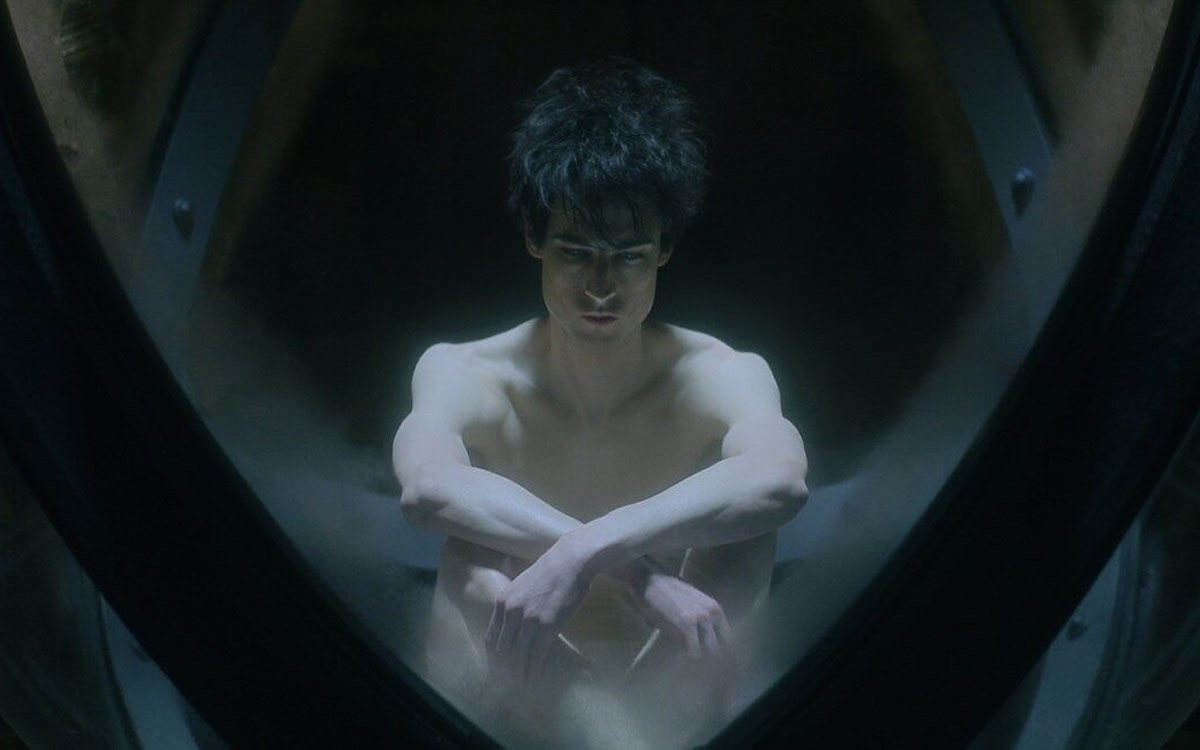
Fans of Neil Gaiman’s iconic comic book and its darkly beautiful, queer-inclusive mystical universe have been waiting for more than 30 years to see it come to the screen, but this moody and stylish Netflix adaptation proved to be well worth their patience. With an excellent Tom Sturridge heading the cast as Morpheus – the saga’s mercurial “hero,” who rules over the Kingdom of Dreams and holds the fate of the human world in his immortal hands – and big-budget production values that bring the striking visual aesthetic of the original comic to thrilling life, it captures Gaiman’s macabre metaphorical fantasy saga and its wide assortment of conflicted, complex characters and themes to a pitch-perfect tee. Sure, some purists might quibble about the gender-swapping and/or reimagining of characters to create an even more diverse and inclusive blend than the original comic – but to us, those flourishes feel like a healthy evolution that only strengthens the appeal of a timeless classic. Besides, any show audacious enough to give us Gwendoline Christie as Lucifer is a masterpiece, in our book.
Movies
As Oscars approach, it’s time to embrace ‘KPop Demon Hunters’
If you’ve resisted it, now’s the time to give in

If you’re one of the 500 million people who made “KPop Demon Hunters” into the most-watched original Netflix title in the streaming platform’s history, this article isn’t for you.
If, however, you’re one of the millions who skipped the party when the Maggie Kang-created animated musical fantasy debuted last summer, you might be wondering why this particular piece of pop youth culture is riding high in an awards season that seems all but certain to end with it winning an Oscar or two; and if that’s the case, by all means, keep reading.
We get it. If you’re not a young teen (or you don’t have one), it might have escaped your radar. If you don’t like KPop, or the fantasy genre just isn’t your thing, there would be no reason for that title to pique your interest – on the contrary, you would assume it’s just a movie that wasn’t made for you and leave it at that.
It’s now more than half a year later, though, and “KPop Demon Hunters” has yet to fade into pop culture memory, in spite of the “new, now, next” pace with which our social media world keeps scrolling by. It might feel like there’s been a resurgence of interest since the film’s ongoing sweep of major awards in the Best Animated Film and Best Song categories has led it close to Oscar gold, but in reality, the interest never really flagged. Millions of fans were still streaming the soundtrack album on a loop, all along.
It wasn’t just the music that they embraced, though that was definitely a big factor – after all, the film’s signature song, “Golden,” has now landed a Grammy to display alongside all of its film industry accolades. But Kang’s anime-influenced urban fantasy taps into something more substantial than the catchiness of its songs; through the filter of her experience as a South Korean immigrant growing up in Canada, she draws on the traditions and mythology of her native culture while blending them seamlessly into an infectiously contemporary and decidedly Western-flavored “girl power” adventure about an internationally popular KPop girl band – Huntrix, made up of lead singer Rumi (Arden Cho), lead dancer Mira (May Hong), and rapper/lyricist Zoey (Ji-young Yoo) – who also happen to be warriors, charged with protecting humankind from the influence of Gwi-Ma (Lee Byung-hun), king of the demon world, which is kept from infiltrating our own by the power of their music and their voices. Oh, and also by their ability to kick demon ass.
In an effort to defeat the girls at their own game, Gwi-Ma sends a demonic boy band led by handsome human-turned-demon Jinu (Ahn Hyo-seop) to steal their fans, creating a rivalry that (naturally) becomes complicated by the spark that ignites between Rumi and Jinu, and that forces Rumi to confront the half-demon heritage she has managed to keep secret – even from her bandmates – but now threatens to destroy Huntrix from within, just when their powers are needed most.
It’s a bubble-gum flavored fever-dream of an experience, for the most part, which never takes itself too seriously. Loaded with outrageous kid-friendly humor and pop culture parody, it might almost feel as if it were making fun of itself if not for the obvious sincerity it brings to its celebration of all things K-Pop, and the tangible weight it brings along for the ride through its central conflict – which is ultimately not between the human and demon worlds but between the long-held prejudices of the past and the promise of a future without them.
That’s the hook that has given “KPop Demon Hunters” such a wide-ranging and diverse collection of fans, and that makes it feel like a well-timed message to the real world of the here and now. In her struggle to come to terms with her part-demon nature – or rather, the shame and stigma she feels because of it – Rumi becomes a point of connection for any viewer who has known what it’s like to hide their full selves or risk judgment (or worse) from a world that has been taught to hate them for their differences, and maybe what it’s like to be taught to hate themselves for their differences, too.
For obvious reasons, that focus adds a strong layer of personal relevance for queer audiences; indeed, Kane has said she wanted the film to mirror a “coming out” story, drawing on parallels not just with the LGBTQ community, but with people marginalized through race, gender, trauma, neurodivergence – anything that can lead people to feel like an “other” through cultural prejudices and force them to deal with the pressure of hiding an essential part of their identity in order to blend in with the “normal” community. It plays like a direct message to all who have felt “demonized” for something that’s part of their nature, something over which they have no choice and no control, and it positions that deeply personal struggle as the key to saving the world.
Of course, “KPop Demon Hunters” doesn’t lean so hard into its pro-diversity messaging that it skimps on the action, fun, and fantasy that is always going to be the real reason for experiencing a genre film where action, fun, and fantasy are the whole point in the first place. You don’t have to feel like an “other” to enjoy the ride, or even to get the message – indeed, while it’s nice to feel “seen,” it’s arguably much more satisfying to know that the rest of the world might be learning how to “see” you, too. By the time it reaches its fittingly epic finale, Kane’s movie (which she co-directed with Chris Appelhans, and co-wrote with Appelhans, Danya Jimenez, and Hannah McMechan) has firmly made its point that, in a community threatened by hatred over perceived differences, the real enemy is our hate – NOT our differences.
Sure, there are plenty of other reasons to enjoy it. Visually, it’s an imaginative treat, building an immersive world that overlays an ancient mythic cosmology onto a recognizably contemporary setting to create a kind of whimsical “metaverse” that feels almost more real than reality (the hallmark of great mythmaking, really); yet it still allows for “Looney Toons” style cartoon slapstick, intricately choreographed dance and battle sequences that defy the laws of physics, slick satirical commentary on the juggernaut of pop music and the publicity machine that drives it, not to mention plenty of glittery K-Pop earworms that will take you back to the thrill of being a hormonal 13-year-old on a sugar high; but what makes it stand out above so many similar generic offerings is its unapologetic celebration of the idea that our strength is in our differences, and its open invitation to shed the shame and bring your differences into the light.
So, yes, you might think “KPop Demon Hunters” would be a movie that’s exactly what it sounds like it will be – and you’d be right – but it’s also much, much more. If you’ve resisted it, now’s the time to give in.
At the very least, it will give you something else to root for on Oscar night.
Movies
50 years later, it’s still worth a return trip to ‘Grey Gardens’
Documentary remains entertaining despite its darkness
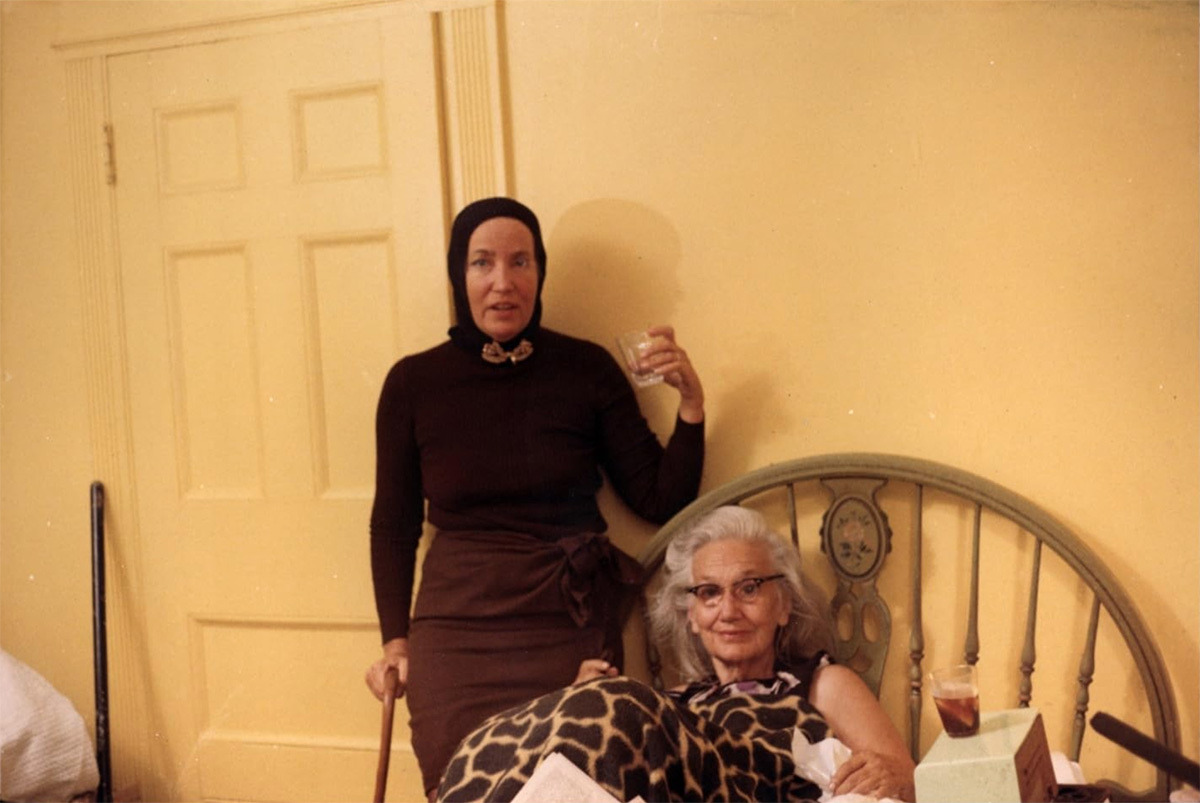
If we were forced to declare why “Grey Gardens” became a cult classic among gay men, it would be all the juicy quotes that have become part of the queer lexicon.
Celebrating the 50th anniversary of its theatrical release this month, the landmark documentary profiles two eccentrics: Edith Ewing Bouvier Beale and her daughter, Edith Bouvier Beale (known as “Big” and “Little” Edie, respectively), the aunt and cousin of former first lady Jaqueline Kennedy Onassis and socialite Lee Radziwell. Once moving within an elite circle of American aristocrats, they had fallen into poverty and were living in isolation at their run-down estate (the Grey Gardens of the title) in East Hampton, Long Island; they re-entered the public eye in 1972 after local authorities threatened eviction and demolition of their mansion over health code violations, prompting their famous relatives to swoop in and pay for the necessary repairs to avoid further family scandal.
At the time, Radziwell had enlisted filmmaking brothers David and Albert Maysles to take footage for a later-abandoned project of her own, bringing them along when she went to put in an appearance at the Grey Gardens clean-up efforts. It was their first encounter with the Beales; the second came two years later, when they returned with their cameras (but without Radziwell) and proceeded to make documentary history, turning the two Edies into unlikely cultural icons in the process.
On paper, it reads like something painful: two embittered former socialites, a mother and daughter living among a legion of cats and raccoons in the literal ruins of their former life, where they dwell on old memories, rehash old conflicts, and take out their resentments on each other, attempting to keep up appearances while surviving on a diet that may or may not include cat food. Truthfully, it is sometimes difficult to watch, which is why it’s easier to approach from surface level, focusing on the “wacky” eccentricities and seeing the Beales as objects for ridicule.
Yet to do so is to miss the true brilliance of a movie that is irresistible, unforgettable, and fascinating to the point of being hypnotic, and that’s because of the Beales themselves, who are far too richly human to be dismissed on the basis of conventional judgments.
First is Little Edie, in her endless array of headscarves (to cover her hair loss from alopecia) and her ever-changing wardrobe of DIY “revolutionary costumes,” a one-time model and might-have-been showgirl who is obviously thrilled at having an audience and rises giddily to the occasion like a pro. Flamboyant, candid, and smarter than we think, she’s also fearlessly vulnerable; she gives us access to an emotional landscape shaped by the heartbreaks of a past that’s gradually revealed as the movie goes on, and it’s her ability to pull herself together and come back fighting that wins us over. By the time she launches into her monologue about being a “S-T-A-U-N-C-H” woman, we have no doubt that it’s true.
Then there’s Big Edie, who comes across as an odd mix of imperious dowager and down-to-earth grandma. She gets her own chance to shine for the camera, especially in the scenes where she reminisces about her early days as a “successful” amateur vocalist, singing along to records of songs she used to perform as glimpses emerge of the beauty and talent she commanded in her prime. She’s more than capable of taking on her daughter in their endless squabbles, and savvy enough to score serious points in the conflict, like stirring up jealousy with her attentions to beefy young handyman Jerry – whom the younger Edie has dubbed “the Marble Faun” – when he comes around to share a feast of boiled corn-on-the-cob with them. “Jerry likes the way I do my corn,” she deadpans to the camera, even though we know it’s meant for Little Edie.
It’s not just that their eccentricities verge on camp; that’s certainly an undeniable part of the appeal, but it falls away quickly as you begin to recognize that even if these women are putting on a show for the camera, they’re still being completely themselves – and they are spectacular.
Yes, their verbal sparring is often shrill and palpably toxic – in particular, Big Edie has no qualms about belittling and shaming her daughter in an obviously calculated effort to undermine her self-esteem and discourage her from making good on her repeated threats to leave Grey Gardens. We know she is acting from fear of abandonment, but it’s cruel, all the same.
These are the moments that disturb us more than any of the dereliction we see in their physical existence; fed by nostalgia and forged in a deep codependence that neither wants to acknowledge, their dynamic reflects years of social isolation that has made them into living ghosts, going through the habitual motions of a long-lost life, ruminating on ancient resentments, and mulling endlessly over memories of the things that led them to their outcast state. As Little Edie says early on, “It’s very difficult to keep the line between the past and the present. Do you know what I mean?”
That pithy observation, spoken conspiratorially to the Maysles’ camera, sets the tone for the entirety of “Grey Gardens,” perhaps even suggesting an appropriate point of meditation through which to contemplate everything that follows. It’s a prime example of the quotability that has helped this odd little movie endure as a fixture in queer culture; for many LGBTQ people, both Edies – born headstrong, ambitious, and independent into a social strata that only wanted its women to be well-behaved – became touchstones of frustrated longing, of living out one’s own fabulousness in isolated secrecy. Add to that shared inner experience Little Edie’s knack for turning scraps into kitschy fashion (and the goofy-but-joyous flag dance she performs as a sort of climactic topper near the end), and it should be obvious why the Maysles Brothers’ little project still resonates with the community five decades later.
Indeed, watching it in today’s cultural climate, it strikes chords that resonate through an even wider spectrum, touching on feminist themes through these two “problematic” women who have been effectively banished for refusing to fit into a mold, and on the larger issue of social and economic inequality that keeps them trapped, ultimately turning them against each other in their powerlessness.
With that in mind, it’s clear these women were never filmed to be objects of ridicule. They’re survivors in a world in which even their unimaginably wealthy relatives would rather look away, offering a bare minimum of help only when their plight becomes a matter of public family embarrassment, and the resilience they show in the face of tremendous adversity makes them worthy of celebration, instead.
That’s why “Grey Gardens” still hits close to home, why it entertains despite its darkness, and why we remember it as something bittersweet but beautiful. By the end of it, we recognize that the two Edies could be any of us, which means they are ALL of us – and if they can face their challenges with that much “revolutionary” spirit, then maybe we can be “staunch” against our adversities, too.
Movies
‘Pillion’ director on bikers, BDSM, and importance of being seen
‘We put a lot of thought and effort into how we depicted the community’
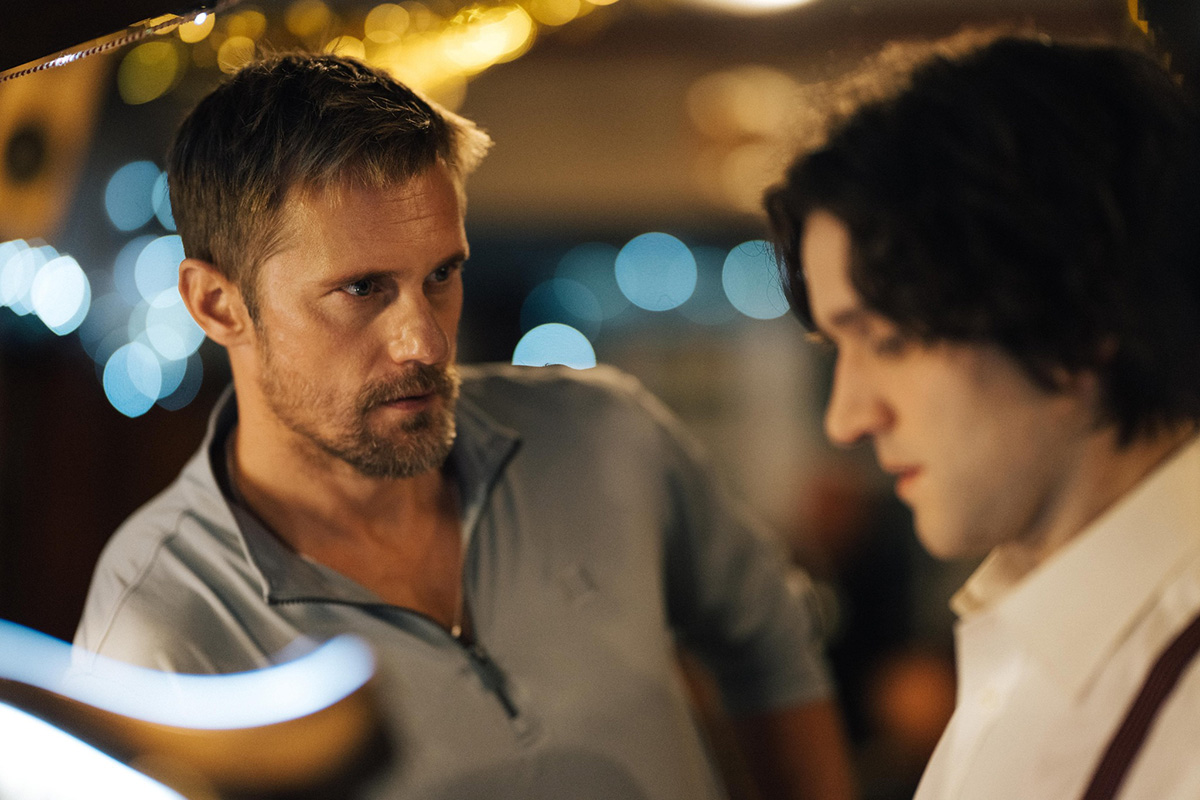
One of the highlights of last week’s Mid-Atlantic Leather Weekend came not on the dance floor, but in a movie theater. In a new partnership, the independent film studio A24 brought its leather-clad new film “Pillion” to D.C. for special showings for the MAL crowd.
“Pillion,” a term for the motorcycle passenger seated behind the driver, delves into the complicated relationship between an introverted, quiet Londoner Colin (Harry Melling) who embarks on a journey finding himself while entering into a sub relationship with a new Dom named Ray (Alexander Skarsgård) he meets during Christmas.
It’s writer-director Harry Lighton’s feature-length debut, sharing Skarsgård’s impossibly toned physique with both Colin and audiences, and offering an eye into the BDSM community by an LGBTQ director for the general public. This from a studio that also just released a movie about ping-pong starring Timothée Chalamet.
The Washington Blade was able to catch a screening at Regal Gallery Place on Jan. 18, hosted by MAL and Gary Wasdin, executive director, Leather Archives & Museum. The Blade also had a chance to interview Lighton about the experience.
Blade: How did you get involved in this film, especially as this is your directorial debut?
Lighton: I was sent “Box Hill,” the novel on which “Pillion” is based, by Eva Yates (the head of film at the BBC). I’d spent years working on a sumo film set in Japan, and then suddenly that became impossible due to the pandemic so I was miserable. And then I read this book that I found bracing, funny, moving. All the good things.
Blade: Are you involved with the leather community? Did you draw on any personal experiences or make connections with the community?
Lighton: I’m involved in the wrestling scene but not the leather community. So I spent lots of time with people who are [in the community] during the writing process, and then ended up casting a bunch of them as bikers and pillions in the film. They were incredibly generous to myself, Harry, and Alex with their knowledge and experiences. We have them to thank for lending credibility to the world on screen.
Blade: What kind of reception have you received at film festivals and with the LGBTQ community? Was it what you imagined?
Lighton: Obviously not everyone’s going to like the film — for some people it’ll be too explicit, for some not explicit enough; some people will feel seen, some won’t. But the general reaction’s been extremely positive so far. If I’m honest I thought it would divide opinion more.
Blade: How was it working with the actors?
Lighton: I had a lot of respect for both of them going in, and wondered if that might make me a bit too deferential, a bit too Colin-coded. But besides being extremely talented, they’re both lovely. And committed. And fun! With my shorts I always felt a bit out of my depth working with actors, but here I discovered a real love for it.
Blade: Turning to the plot, the parents are pretty supportive, especially Colin’s dad. How did you decide to draw his parents? What does it mean to show parents with nuanced viewpoints?
Lighton: I wanted to reverse the typical parent-child dynamic in queer film, where parents go from rejecting to accepting their queer kid. We meet Colin’s parents actively pushing him toward a gay relationship. But when the relationship he lands on doesn’t meet her definition of healthy, his mum withdraws her acceptance. I wanted to ask: Are they projecting their romantic model onto their son, or do they have a legitimate concern for his wellbeing with Ray?
Blade: How did you decide to place the setting?
Lighton: Practically, we needed somewhere within reach of London. But I liked the idea that Colin, who lives life on the periphery, grew up on the edge of the capital. One of our producers, Lee Groombridge, grew up in and around Bromley and showed me all the spots. I loved the atmosphere on the high street, the markets, and the contrast between the high street and the idyllic park. And I thought it would be a funny place for Alexander Skarsgård to have settled.
Blade: What do you hope audiences take away from the film?
Lighton: There’s no one message. Different people will take different things from it. Personally, Colin inspires me to jump off cliffs, to push beyond my comfort zone because that’s where life begins. From Ray I get the courage to be ugly, to fly in the face of social convention if it doesn’t make you happy or it’s not built for you.
Blade: Talk about the soundtrack — especially the Tiffany “I Think We’re Alone Now” song.
Lighton: Skarsgård’s Ray has the surface masc-ness that comes with looking like a Viking. I wanted to combine that with details that indicate he’s been a part of gay culture and “I Think We’re Alone Now” is nothing if not a camp classic.
Blade: What does it mean to you to show the film at MAL?
Lighton: When I told the bikers from the film I was coming to MAL they practically wet themselves with excitement. We put a lot of thought and effort into how we depicted the community in the film and there’s so much variety, no two Masters or subs are the same, but seeing a theater full of men in leather laugh, cry, and clap for the film meant the world.





